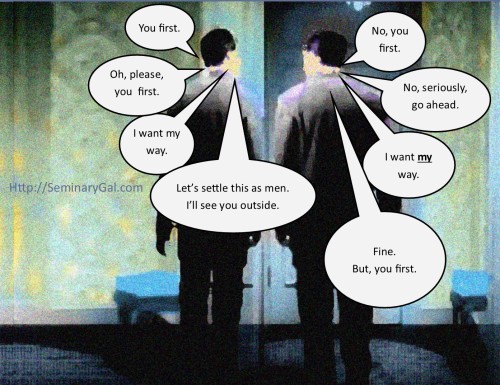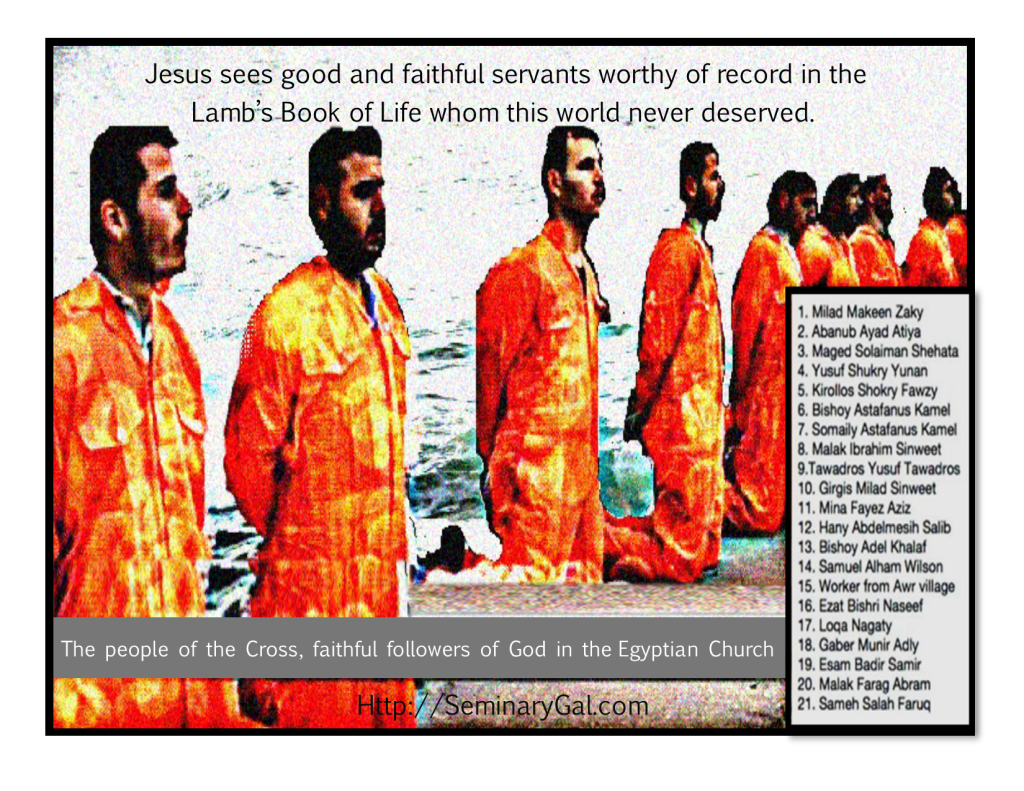When we last encountered the adventures of the earliest Church, we saw the apostles thrown in prison as we moved from Pure Church to Powerful Church to Growing Church to the Persecuted Church. Yes, the disciples have been in prison, were broken out of jail by an angel and then dragged back into court, essentially, by the religious officials.
Last week, in the climax of testimony instead of pleading the 5th, the disciples cry out,
“We must obey God rather than men! 30 The God of our fathers raised Jesus from the dead– whom you had killed by hanging him on a tree. 31 God exalted him to his own right hand as Prince and Savior that he might give repentance and forgiveness of sins to Israel. 32 We are witnesses of these things, and so is the Holy Spirit, whom God has given to those who obey him.”
That went over like a lead balloon among the religious leaders who had earlier said they didn’t like being made to feel guilty over their role in crucifying Jesus.
Which brings us to today’s passage in the adventures of the apostles known as Acts. Today we’ll look at Acts 5:33-42
Acts 5:33 When they [the religious officials] heard this [i.e. that whole obeying God rather than men thing] they were furious and wanted to put them to death.
Ironic isn’t it that they didn’t want Jesus’ blood on their hands and now they’re looking to add the disciples’ blood to it? Anger makes people do bad stuff. Conniving stuff. Irrational stuff.

-
An elderly lady was well known for her faith and for her boldness and talking about it. She would stand on her front porch and shout, “Praise the Lord!”
-
Next door to her lived an atheist who would get so angry at her proclamations he would shout, “There ain’t no Lord!!”
-
Hard times set in on the elderly lady and she prayed for God to send her some assistance. She stood on her porch and shouted, “Praise the Lord!! God, I need FOOD!! I am having a hard time. Please, Lord, send me some groceries!!”
-
The next morning, the lady went out on her porch and saw a large bag of groceries and shouted, “Praise the Lord!!”
-
The neighbor jumped from behind a bush and said, “Aha! I told you there was no Lord. I bought those groceries. God didn’t.”
-
The lady started jumping up and down and clapping her hands and saying, “PRAISE THE LORD!!! He not only sent me groceries, but He made the devil pay for them!!”
Yes, anger seldom accomplishes what we intend. Or in the words of Jane Austen, “angry people are rarely wise.”
To keep the religious officials from adding more blood—that of the disciples—to the blood they’d already shed—that of Jesus—a religious leader steps in and offers wise advice. Gamaliel’s advice might be summarized
Keep Calm and Learn from History.”
I love this section with Gamaliel because I believe it offers a very effective key to understanding Jewish evangelism. It’s all about Messianic expectations. These religious officials weren’t to be faulted for expecting the Messiah. That’s what they were told to do! They just weren’t expecting what God was doing in the person of Jesus of Nazareth. They didn’t see, therefore, that Jesus was the Messiah.
So here’s where Gamaliel enters the scene. Who is he? Well, he was a prominent teacher of the law known in both present-day Jewish circles as well as Christian circles. He was the son of the teacher Simon and the grandson of great teacher Hillel, both of whom were regarded highly with respect to the law. Gamaliel is among the “heads of the schools” and was the first president of the Great Sanhedrin of Jerusalem, according to Jewish sources. Because of Gamaliel, we have external evidence (outside our Bibles) that what we are about to hear actually occurred. We see Gamaliel surface one more time in Acts 22:3 where Paul identifies himself as a student of Gamaliel (which was a source of considerable pride for Paul since Gamaliel was the greatest teacher of his era and embodied the best of Pharisaical thought). So Gamaliel is an important guy…and hinge on which evangelism can turn and a bridge to our Jewish brothers and sisters. Here’s why.
Let’s pick up in verse 34 But a Pharisee named Gamaliel, a teacher of the law, who was honored by all the people, stood up in the Sanhedrin and ordered that the men be put outside for a little while. 35 Then he addressed them:
“Men of Israel, consider carefully what you intend to do to these men. 36 Some time ago Theudas appeared, claiming to be somebody, and about four hundred men rallied to him. He was killed, all his followers were dispersed, and it all came to nothing. 37 After him, Judas the Galilean appeared in the days of the census and led a band of people in revolt. He too was killed, and all his followers were scattered. 38 Therefore, in the present case I advise you: Leave these men alone! Let them go! For if their purpose or activity is of human origin, it will fail. 39 But if it is from God, you will not be able to stop these men; you will only find yourselves fighting against God.”
Gamaliel’s wisdom was evident. He was a great teacher and also clearly a student of history.
- Even better than the Sunday School teacher teaching a bunch of 4th graders. The lesson had just finished and the teacher asked if the children had any questions. Little David quickly raised his hand.
- “Yes, David? What question would you like to ask me?”
- “I have four questions to ask you, Teacher. Is it true that after the children of Israel crossed the Red Sea, they then received the Ten Commandments?”
- “Yes, David.”
- “And the children of Israel also defeated the Philistines?”
- “Yes, David, that’s also true.”
- “And the children of Israel also fought the Romans and fought the Egyptians and built the Temple?”
- “Again you are correct, David.”
- “So my real question I guess is, Teacher, what were the grown-ups doing all this time?”
Gamaliel’s teaching showed he knew his theology and he knew his history. He urged those who were angry to Keep Calm and Learn from History. Patience is often a very good thing. Gamaliel brought up two cases from history to demonstrate that God’s will triumphs even if men are free to disobey. That is a perfectly consistent idea within Pharisaical thought: man is free to disobey, but God’s will prevails in the end.
- The first guy is Theudas, about whom we know nothing other than his mention here. Although I always find things like this interesting. There is someone whose life was purposeful in God’s plan in some way to be mentioned in Scripture even if history overlooks his role. Scripture says nothing except verse 36 Some time ago Theudas appeared, claiming to be somebody, and about four hundred men rallied to him. He was killed, all his followers were dispersed, and it all came to nothing
- But there’s also a guy named Judas the Galilean who was written about by the Jewish historian Josephus. 37 After him, Judas the Galilean appeared in the days of the census and led a band of people in revolt. He too was killed, and all his followers were scattered.
Both men initially looked like they might be “somebody” (i.e. the Messiah) because they led revolt. But there was a problem: they died. Thought to be somebody, but they turned out as not anybody other than a regular Joe or Theudas or Judas the Galilean. Death was the ultimate disqualifier. And that’s why Jews—then and now—have such a problem with Jesus. Jews from the various theological traditions (Orthodox, Conservative, Reform) disagree on just about everything except that Jesus could not possibly be the Messiah. And behind that belief is the fact of Jesus’ death.
So Gamaliel says, Keep Calm and Learn from History. Theudas (somebody) died: nobody. Judas the Galilean (somebody) died:nobody. Jesus somebody died….and He’s either a nobody like all the others or He’s a somebody…a real Somebody like the Messiah…and
38 Therefore, in the present case I advise you: Leave these men alone! Let them go! For if their purpose or activity is of human origin, it will fail. 39 But if it is from God, you will not be able to stop these men; you will only find yourselves fighting against God.”
One of the historical points of reference was what we heard about in our Old Testament reading (2 Chronicles 13:10-12) from this morning, fighting against God is always a losing battle.
Wait it out. See what happens. God won’t let a false messiah stand. Eventually they will crumble from the weight of their own lies. They die and it all goes away. So, Keep Calm and Learn from History.
40 His speech persuaded them.
He persuaded them not to kill the apostles, but these religious officials still felt like there had to be some kind of punishment so the officials…
They called the apostles in and had them flogged. Then they ordered them not to speak in the name of Jesus, and let them go. 41 The apostles left the Sanhedrin, rejoicing because they had been counted worthy of suffering disgrace for the Name.
The apostles, too, kept calm and learned from history. They looked at Jesus who died but whom they knew was raised from the dead. They firmly believed because they had seen the Risen Lord in real time and recent history who commanded them to proclaim the Good News. Remember all the way back in Acts 1 before Jesus left, He told them that this is what they were supposed to do: bring the Gospel to all the nations? They’re obeying orders.
So, for a moment put yourself in the shoes of Gamaliel: How do you deal with situations when anger is boiling up around you or within you? Do you urge patience? To Keep Calm and Learn from History? Do you react without thinking through the consequences? Had the Sanhedrin killed the disciples, they would have been fighting against God who was certainly able to raise up others. Doesn’t Scripture say that if we’re silent, even the stones would cry out? Fighting against God is a losing battle.
Perhaps this is a good time for a second group of questions. Are there any ways you are fighting God on something? Perhaps something He wants you to do? Something He wants you to say? Maybe you’re still squirming in His hand and not wanting to believe that Jesus is who He says He is? Jesus of Nazareth has been the Messiah for almost 2,000 years. The movement has does anything but die out. The world has thrown Christians to the lions, crucified them, shot them, and burned them alive. The world has beheaded them, tortured them, and imprisoned them. The world has laughed at them, ridiculed them, shamed them, enslaved them, and economically targeted them. The irony is the more persecuted the Church becomes, the more it grows. It’s like one of those puffball mushrooms. You can stomp on it, kick it, dig it out and throw it away, but the spores scatter and it multiplies. So it is with the Church….for 2000 years, it has been growing, advancing and the gates of Hell will not prevail against it!
Ash Wednesday is this week. The beginning of Lent. If there are ways you’ve been fighting a losing battle against God for ownership of your life, this is a good time to lay that aside and trust Him. Be ready to take Him at His Word.
Put yourself in the shoes of the apostles who spoke boldly that they’d obey God rather than men.
The death of Jesus is the turning point, the hinge on which Jewish evangelism (and all evangelism) turns because of His resurrection. It’s why the apostles brought it up time and again. Because unlike Theudas and Judas the Galilean, Jesus did not remain dead.
Mohammed? Still dead. Karl Marx? Still dead. Friedrich Nietzsche? Yup. He’s dead. Joseph Smith? Still dead. Confuscious, Socrates, Plato, dead, dead, dead. Jesus is not! He rose from the dead and is very much alive. He had to die in order for us to be saved. Our sin and God’s holiness required this intermediary step between Jewish expectation of the Messiah and the Return of the vindicating King. If there had not been this intermediary step of dealing with our sin problem, there’d be no one righteous when the powerful Messiah came to bring His holy ones to heaven. It’d be a quick trip with nothing to see and He’d go home alone…if He hadn’t dealt with our sin.
So finally, as a thought for today, still in the shoes of the apostles: Keep Calm and Learn from History. That’s how they could rejoice even after having been beaten 40 lashes minus one. For the 21 Coptic Christians (from Egypt) who were captured and taken by ISIS, they knew they may end up beheaded, or in a cage and burned alive…simply because they are Christians. The latest that I heard is that the Libyan parliament confirmed their deaths and that they were kidnapped because of their Christian faith. That’s bad news, awful news, tragic news for sure, but here’s their hope, their calm, and their peace. It comes from the fact that History is God’s history. It’s His Story. It’s Jesus’ story of redemption and rescue and God’s great love. And to those who captured innocents and have been doing the killings, they cannot rest easy. Why? Because fighting against God is always a losing battle. That’s how these 21 captives could rejoice in prison, even in martyrdom. God is on their side. No one can snatch them out of God’s hands. And nothing, nothing, nothing! could separate them from the love of God in Christ Jesus! The Pure Church, the Powerful Church, the Growing Church becomes the Persecuted Church and yet, they can do, we can do, the very same thing that the disciples did.
42 Day after day, in the temple courts and from house to house, they never stopped teaching and proclaiming the good news that Jesus is the Christ.
Keep Calm. Carry On. Learn from History. God will not be mocked. Fighting against God is always a losing proposition. We have the end of the book and it tells us God wins. So, Keep Calm. Carry On. And Learn from His Story.
Let’s pray.
=====
By way of reminder, the 2015 Lenten Devotionals entitled With Christ in the Upper Room will begin on Ash Wednesday (February 18th). If you’ve signed up to receive them on the Seminary Gal Home Page side bar, you will be receiving those automatically via email on Monday through Saturday, as well as the Sunday preaching messages during the Lent time frame.
 There are times it’s helpful to rewind and replay something to see the most pertinent scenes again. Like when watching a favorite movie or some sort of thriller in which there are crucial scenes on which the entire plot turns. This is one of those scenes With Christ in the Upper Room.
There are times it’s helpful to rewind and replay something to see the most pertinent scenes again. Like when watching a favorite movie or some sort of thriller in which there are crucial scenes on which the entire plot turns. This is one of those scenes With Christ in the Upper Room. And yet, what do we see here? Jesus was setting an example by continuing to give last chances for Judas and opportunities for the rest of the disciples to learn what it means to serve others. To love the brethren, yes, but also what it means to love our enemies.
And yet, what do we see here? Jesus was setting an example by continuing to give last chances for Judas and opportunities for the rest of the disciples to learn what it means to serve others. To love the brethren, yes, but also what it means to love our enemies. John 13: 9 “Then, Lord,” Simon Peter replied, “not just my feet but my hands and my head as well!” 10 Jesus answered, “A person who has had a bath needs only to wash his feet; his whole body is clean. And you are clean, though not every one of you.” 11 For he knew who was going to betray him, and that was why he said not every one was clean.
John 13: 9 “Then, Lord,” Simon Peter replied, “not just my feet but my hands and my head as well!” 10 Jesus answered, “A person who has had a bath needs only to wash his feet; his whole body is clean. And you are clean, though not every one of you.” 11 For he knew who was going to betray him, and that was why he said not every one was clean. Stubbornness and serving are incompatible.
Stubbornness and serving are incompatible.
 John 13:2 The evening meal was being served, and the devil had already prompted Judas Iscariot, son of Simon, to betray Jesus. 3 Jesus knew that the Father had put all things under his power, and that he had come from God and was returning to God; 4 so he got up from the meal, took off his outer clothing, and wrapped a towel around his waist. 5 After that, he poured water into a basin and began to wash his disciples’ feet, drying them with the towel that was wrapped around him.
John 13:2 The evening meal was being served, and the devil had already prompted Judas Iscariot, son of Simon, to betray Jesus. 3 Jesus knew that the Father had put all things under his power, and that he had come from God and was returning to God; 4 so he got up from the meal, took off his outer clothing, and wrapped a towel around his waist. 5 After that, he poured water into a basin and began to wash his disciples’ feet, drying them with the towel that was wrapped around him. In the Greek language, it has a double meaning. It means both that He loved them to the very end of His days as well as He loved them to the fullest extent possible, which for Jesus, the Son of God, is a lot.
In the Greek language, it has a double meaning. It means both that He loved them to the very end of His days as well as He loved them to the fullest extent possible, which for Jesus, the Son of God, is a lot.


